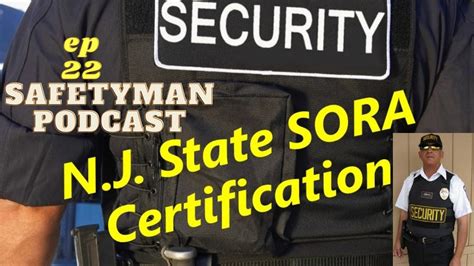How To Obtain A Sora License In Nj
Ronan Farrow
Apr 01, 2025 · 3 min read

Table of Contents
How to Obtain a SORA License in NJ
So you're looking to get a SORA license in New Jersey? This guide will walk you through the process, clarifying the requirements and steps involved. Let's get started!
What is a SORA License?
The Secure and Reliable Operations of the Regional Transmission (SORA) license in New Jersey isn't actually a license in the traditional sense. The term "SORA license" is often used colloquially to refer to the licensing and regulatory compliance required for entities involved in the operation and maintenance of New Jersey's electric transmission system. This mainly involves complying with the regulations set forth by the Board of Public Utilities (BPU), and demonstrating adherence to established standards for safety and reliability. It's crucial to understand that there isn't a single "SORA license" document to obtain. Instead, compliance involves multiple steps and potentially multiple permits or approvals from the BPU and other relevant agencies.
Key Requirements for Compliance (often mistakenly called "SORA License")
Compliance with the spirit of what people refer to as a "SORA License" involves meeting several stringent requirements. These requirements ensure the safe and reliable operation of the power grid within the state. Here are some of the key aspects:
1. Safety Standards Adherence:
- Strict adherence to OSHA (Occupational Safety and Health Administration) regulations: This is paramount, as it covers worker safety during all aspects of transmission operations and maintenance.
- Compliance with industry best practices: Following established industry guidelines and best practices for transmission line maintenance, upgrades, and new installations is crucial. These practices are often detailed in specific BPU guidelines and technical standards.
- Regular inspections and maintenance: Demonstrating a robust plan for regularly inspecting and maintaining all transmission equipment is critical to maintaining safety and reliability.
2. Reliability Standards Compliance:
- Meeting performance targets: Maintaining high performance standards to minimize outages and disruptions to the electric grid is a core requirement. This often involves proactive maintenance and technological upgrades.
- Grid modernization efforts: Participation in any grid modernization programs or initiatives promoted by the BPU or other regulatory bodies helps demonstrate commitment to reliability.
- Cybersecurity measures: Implementing robust cybersecurity measures to protect the electric grid from cyber threats is increasingly crucial and falls under reliability standards.
3. Regulatory Compliance with the BPU:
- Submitting applications and reports: Regularly filing necessary applications, reports, and documentation with the BPU is essential. Failure to submit required documentation can result in delays and penalties.
- Responding to BPU inquiries: Cooperating fully and promptly responding to any inquiries or requests from the BPU is crucial for maintaining compliance.
- Understanding BPU regulations: Thoroughly understanding all applicable BPU regulations and guidelines is critical. This may necessitate consulting with legal and engineering experts.
Steps to Achieve Compliance (in place of obtaining a "SORA license")
The process isn't a straightforward "application and license" scenario. Instead, it involves continuous compliance and interaction with the BPU:
-
Consult with Legal and Engineering Experts: Given the complexity of the regulations, seeking advice from legal and engineering professionals experienced in New Jersey's energy regulatory landscape is highly recommended.
-
Thorough Review of BPU Regulations: Meticulously review all applicable BPU regulations, technical standards, and guidelines to ensure complete understanding.
-
Develop a Comprehensive Compliance Plan: Create a detailed plan outlining your strategy for achieving and maintaining compliance, covering safety, reliability, and reporting requirements.
-
Implement and Maintain the Plan: Put your compliance plan into action and maintain it rigorously. This involves routine inspections, maintenance, reporting, and continuous improvement.
-
Regular Communication with BPU: Maintain open and regular communication with the BPU, promptly responding to inquiries and submitting required documentation.
Important Note:
This information is for general guidance only. Always consult directly with the New Jersey Board of Public Utilities (BPU) and seek professional legal and engineering advice for specific compliance requirements related to the operation and maintenance of the state's electric transmission system. The term "SORA license" is a colloquialism, and the actual process involves multifaceted compliance and regulatory adherence rather than a single license.
Featured Posts
Also read the following articles
| Article Title | Date |
|---|---|
| How To Increase Dupr Rating | Apr 01, 2025 |
| How To Install Saloon Door Hinges | Apr 01, 2025 |
| How To Join Enshrouded Server By Ip | Apr 01, 2025 |
| How To Paint Front Grill Of A Car | Apr 01, 2025 |
| How To Paint Drop Ceiling Grid | Apr 01, 2025 |
Latest Posts
Thank you for visiting our website which covers about How To Obtain A Sora License In Nj . We hope the information provided has been useful to you. Feel free to contact us if you have any questions or need further assistance. See you next time and don't miss to bookmark.
